The Essential Guide to Choosing Replacement Trays
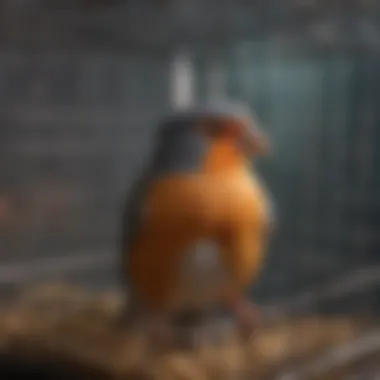
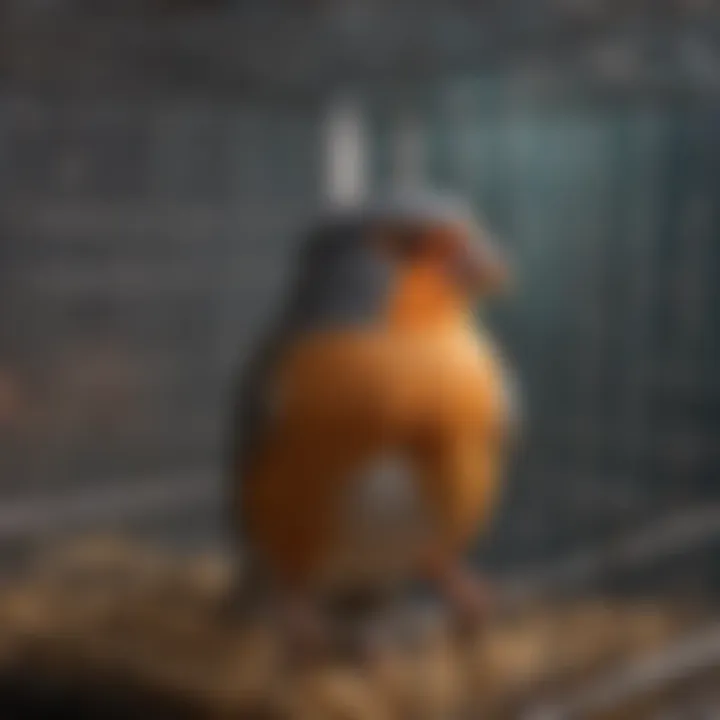
Intro
Maintaining a clean and healthy environment for pet birds is essential for their well-being. One often overlooked element is the replacement tray in bird cages. These trays play a critical role in managing waste, ensuring hygiene, and promoting a stress-free habitat for avian companions. Understanding how to choose and take care of these trays can greatly enhance the life of a bird owner and the health of their pets.
In this guide, we will explore the necessary considerations for selecting the right replacement trays, focusing on materials, size compatibility, and effective cleaning techniques. We will also examine how these trays contribute to preventing health issues and improving the overall experience of bird ownership.
Care Tips
Caring for bird cages involves multiple aspects, among which maintaining replacement trays is crucial. These trays should be cleaned regularly and chosen wisely. A well-maintained tray not only keeps the cage clean but also affects the health of your bird. Here are some care tips:
Daily Care Routines
- Inspect the tray daily for any signs of waste accumulation or damage. Clean up droppings promptly to prevent bacteria growth.
- Replace disposable paper or liners frequently, ideally daily, to minimize odors and mess.
Cage Setup and Maintenance
Once you have the right replacement tray, the way you set up the cage matters. Ensure the tray fits snugly into the cage base, preventing spills. Adjust the cage height for easy access when replacing or cleaning the tray.
Hygiene and Cleaning Practices
To maintain a healthy environment, consistent cleaning is necessary. Here are some practices that can help:
- Use warm water and a mild detergent for cleaning the trays. Avoid harsh chemicals that can be harmful to birds.
- Scrub the tray with a non-abrasive sponge to remove any stains or residue.
- Rinse thoroughly before placing it back in the cage to remove any leftover soap.
Seasonal Care Adjustments
Changing seasons can affect your cleaning routines. In warmer months, waste decomposes faster, so additional cleaning may be necessary. During colder months, be mindful of any increased moisture, and ensure proper ventilation to avoid mold growth.
Behavioral Insights
Understanding your bird's behavior can greatly help in maintaining a positive living space. The condition of the cage, including replacement trays, can influence a bird's mood and overall health.
Understanding Bird Body Language
Birds communicate through body language. Observe their behavior and adjust the cage setting accordingly. If a bird seems distressed, check the tray and cage for cleanliness and comfort.
Common Behavioral Issues and Solutions
Not maintaining a clean cage can lead to issues such as aggression or anxiety. If you notice these, consider:
- Cleaning the cage more frequently.
- Adding toys that encourage healthy play to distract from stressors.
Positive Reinforcement Techniques
Use treats to encourage your bird to interact with the cage positively. Proper cleaning helps in preventing irritations that could lead to negative behavior.
Social Interaction Needs
Birds are social creatures, and how you set up their environment matters. Provide space for interaction away from the tray area, ensuring they feel secure and happy.
Nutrition Guides
A clean cage enhances the ability to maintain proper nutrition for your bird. Nutritional needs vary by species, but here are some essential components to consider:
Essential Diet Components
- Seeds and pellets are critical for energy.
- Fresh fruits and vegetables provide vitamins.
Safe and Toxic Foods
Familiarize yourself with safe foods for your bird. Some common toxic foods include avocados, chocolate, and caffeine.
Supplements and Treats
Consider adding bird-safe supplements as necessary. Occasionally, small treats can also motivate the bird to engage positively.
Feeding Strategies for Different Species
Each bird species has unique dietary needs. Adjust offerings according to the specific requirements of your pet.
Wellness and Health
Regular attention to your pet’s health is paramount. Cleanliness plays a crucial part in maintaining wellness.
Routine Health Checkups
Schedule regular vet visits to monitor your bird's health. A clean environment supports overall well-being and early symptom detection.
Identifying Symptoms of Illness
Watch for changes in behavior, appetite, or droppings. A clean tray helps in the clear observation of any potential health issues.
Preventative Care and Vaccinations
Stay informed about vaccinations necessary for your bird species. Maintaining hygiene can help in reducing the risk of diseases.
Mental and Emotional Well-being
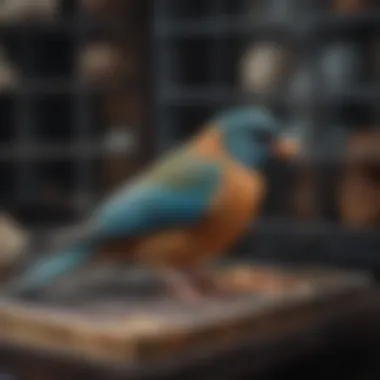
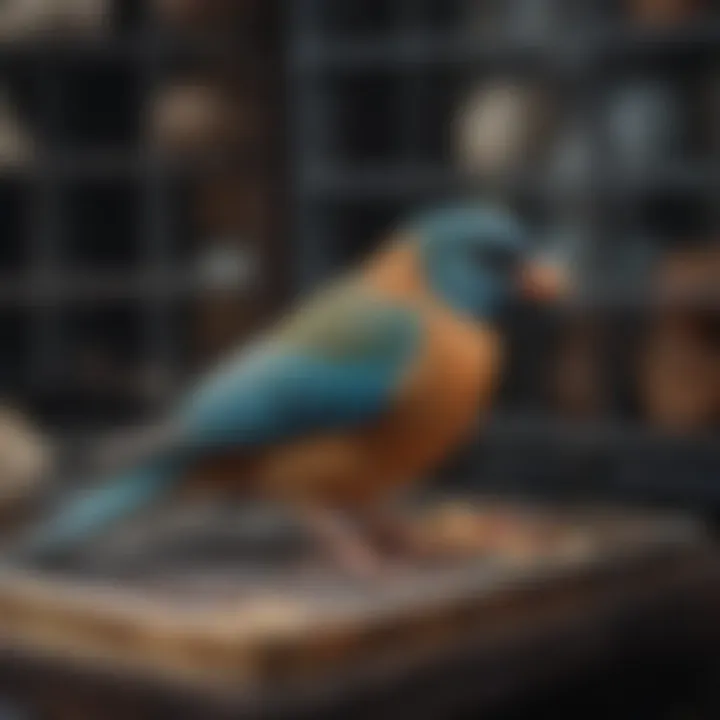
Birds need stimulation to thrive. A clean, engaging space contributes to emotional health.
Enriching Activities
Providing mental enrichment is critical for birds. Incorporate activities that keep their spirits high and their minds sharp.
Toys and Playtime Ideas
Offer various toys and safe objects for chewing and playing. Replace damaged toys regularly.
Training and Tricks
Birds can learn tricks and simple commands. This interaction fosters a bond and adds excitement to their environment.
Outdoor Activities and Interaction
Occasionally, allow for supervised outdoor time for fresh air and new sights, while monitoring the cleanliness of any temporary trays used.
DIY Projects for Mental Stimulation
Consider crafting homemade toys or puzzles that challenge your bird while keeping the cage organized and clean.
Cleanliness is not just about hygiene; it's a foundation for a thriving and happy bird life.
Choosing and maintaining replacement trays is paramount in fostering a safe and healthy environment for pet birds. Care strategies, behavior understanding, nutrition insights, and enrichment activities all play a role in optimal bird care. By implementing these insights, one ensures the best life possible for their feathery companions.
Understanding Replacement Trays
Replacement trays are essential components in the habitat of pet birds. They serve a fundamental purpose that directly impacts cleanliness and comfort within the cage environment. Understanding their significance is crucial for bird owners who want to offer a safe and healthy space for their avian companions.
Definition and Purpose
Replacement trays are removable containers designed to catch and hold debris, waste, and food particles that birds might scatter in their cages. These trays fit securely beneath the perches and feeding areas, allowing for an easy cleanup process. The primary purpose of these trays is not just maintenance; they play an important role in hygiene and the overall well-being of birds.
Using replacement trays means owners can swiftly manage waste accumulation, which helps in sustaining a clean environment. A clean bird cage leads to less stress for the bird and a reduced likelihood of developing health issues related to waste buildup, such as infections or parasites.
Importance for Avian Health
The health of avian pets hinges on many factors, but cleanliness is paramount. When replacement trays are not utilized, or when they are poorly maintained, bacteria and pathogens can proliferate. This leads to numerous health risks for birds, including respiratory problems and gastrointestinal disturbances.
It is essential to routinely inspect and clean these trays to minimize health risks. Using trays that are the right size and material can further aid in maintaining the hygiene of the cage. Meadows' studies have shown that neglecting proper upkeep of bird cages can result in serious health complications. Owners should take this seriously.
By ensuring that the trays are cleaned regularly, bird owners contribute to a healthier living environment, reducing allergens and pathogens that birds may encounter. Ultimately, understanding the purpose and significance of replacement trays is crucial for avian health, and it reflects the owner’s dedication to their pet's welfare.
Types of Replacement Trays
Understanding the various types of replacement trays is fundamental for bird cage maintenance. The right tray can improve cleanliness, reduce mess, and support the health of your avian companions. Each material brings its own characteristics that can affect how you maintain your bird's environment.
Plastic Trays
Plastic trays are a common choice among bird owners for several reasons. They are typically lightweight and easy to handle, which makes them convenient for cleaning and replacement. Many plastic trays are designed to fit securely in the cage, which can help minimize spillage and keep the living area tidy.
Pros of Plastic Trays
The key advantage of plastic trays is their durability. They can withstand repeated use without cracking or breaking. Additionally, plastic trays are resistant to moisture, which helps prevent mold and bacterial growth. This resistance is crucial for ensuring a hygienic environment for your birds. Many users appreciate that plastic trays are often available in various colors and sizes, accommodating different cage designs easily. Another beneficial aspect is their cost-effectiveness. Generally, plastic trays tend to be less expensive compared to other materials, making them a popular choice for many bird owners.
Cons of Plastic Trays
Despite their benefits, plastic trays do have some downsides. One common issue is scratching. Over time, plastic can become scratched, which may harbor bacteria despite cleaning efforts. Some birds, particularly those with strong beaks, can damage plastic trays by chewing on them. This can potentially lead to pieces being ingested, which is a serious health concern. Additionally, plastic may not provide the same aesthetic appeal as other materials like wood or metal, which some owners value for their cages.
Metal Trays
Metal trays are another viable option for many bird owners. These trays often come in stainless steel or aluminum, both of which are resilient and offer a long lifespan. They present an elegant look that can suit various decor styles. Metal trays are less likely to absorb odors compared to some other materials.
Pros of Metal Trays
One of the primary benefits of metal trays is their durability. They do not chip or break easily, which is important for high-energy birds. Metals are also often non-porous, making them easier to sanitize. This feature promotes a cleaner environment, essential for avian health. Moreover, many metal trays can withstand extreme temperatures, which can be useful during summer heat or winter chill. Additionally, metal trays usually boast a longer lifespan than their plastic counterparts, which could imply fewer replacements over time.
Cons of Metal Trays
However, metal trays are not without their issues. A significant drawback is the weight; they can be heavier to handle than plastic trays, especially when full of bedding or waste. Some metal trays also have the potential to rust, particularly if they are not made from quality stainless steel. This could lead to health risks for your birds if ingested. Additionally, they can cause injuries if a bird tries to perch on the edges; sharp edges are a concern with poorly designed products.
Wooden Trays
Wooden trays are less common but offer unique benefits. They can provide a natural look and feel in bird cages. They may be preferred for certain types of birds that appreciate wood for chewing. However, their maintenance requires careful attention.
Pros of Wooden Trays
The distinct advantage of wooden trays lies in their organic appeal. They are often made from materials like pine or cedar, which can provide a soft feel for birds that need a safe surface to play or rest on. Enrichment occurs as many birds enjoy chewing wood, which naturally supports their beak health. Additionally, wood can provide a certain level of insulation, helping to keep birds comfortable in varying temperatures.
Cons of Wooden Trays
On the downside, wooden trays can absorb moisture and odors, leading to hygiene problems over time. They require regular maintenance to prevent mold and decay. Unlike plastic and metal, wood does not lend itself well to frequent sanitization. Wooden trays also may not last as long under harsh treatment, particularly from larger birds. In some cases, they may be more susceptible to damage from water or waste, leading to premature replacements.
Material Considerations
Choosing the right material for replacement trays in bird cages is essential for several reasons. Understanding the implications of materials not only contributes to a cleaner environment but directly relates to the health and safety of birds. The correct selection can lead to improved longevity of the trays, enhanced safety for birds, and simplified cleaning processes. Each of these aspects holds significant weight for pet bird owners, breeders, and those aspiring to keep birds as companions.
Durability
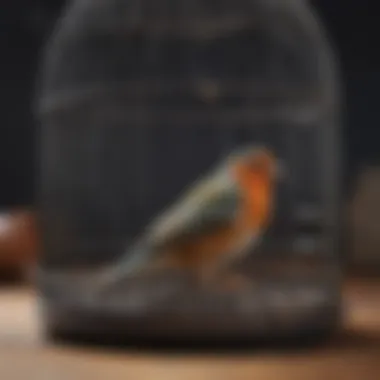
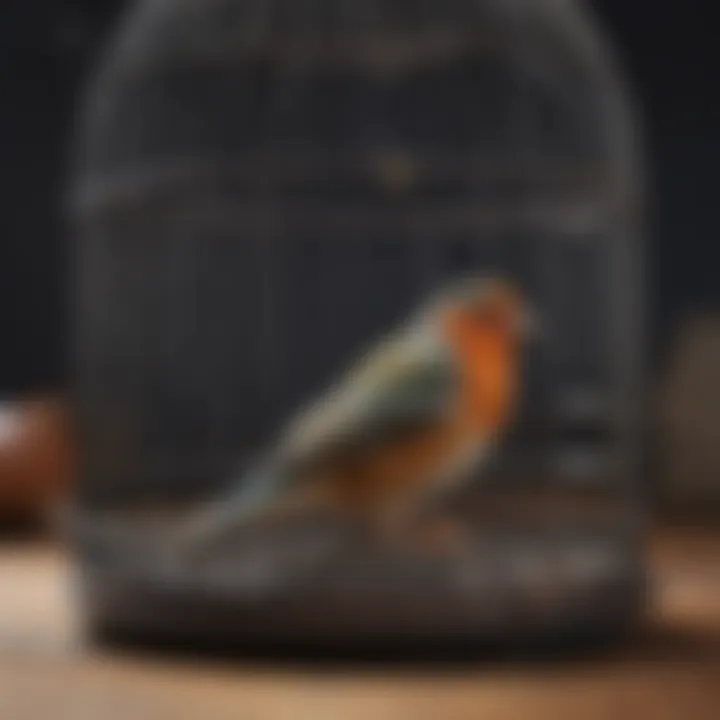
Durability is a chief factor when selecting replacement trays. Trays endure daily wear and tear due to regular cleaning and the activity of the birds themselves. Opting for materials that resist chipping, warping, or cracking can result in substantial long-term savings by reducing the frequency of replacements. Plastic trays often offer a good combination of lightweight and strength, while metal trays provide superior durability. Wooden trays, while aesthetically pleasing, may not stand up as well to moisture and unusual bird activity over time.
Safety for Birds
Safety should always come first when it comes to pet birds. Some materials, like untreated metal or certain types of plastics, may release harmful chemicals or toxins that could jeopardize a bird's health. When selecting trays, it's crucial to choose options labeled as safe for avian use. Additionally, consider possible sharp edges or small detachable parts that could pose a choking hazard. Choosing smooth-edged, bird-safe materials minimizes these risks.
Ease of Cleaning
Cleaning is an unavoidable reality for bird owners. The best replacement trays should be easy to clean, allowing for efficient maintenance routines. Plastic trays are often favored in this regard because their non-porous surface resists staining and is typically dishwasher safe. Metal trays, while durable, may require more effort to maintain shine, necessitating special cleaners. Wooden trays can absorb odors and stains, leading to a more complicated cleaning process. Selecting a tray that enhances your cleaning routine will not only contribute to the health of your birds but ultimately results in a more satisfying ownership experience.
"Choosing the right materials for bird cage trays is not just a cost decision, but a health decision for your pet."
In essence, the choice of material when selecting replacement trays plays a critical role in protecting the health and well-being of birds. By considering durability, safety, and ease of cleaning, bird owners can ensure a cleaner, safer, and more comfortable environment for their feathered companions.
Choosing the Right Size
Choosing the right size for replacement trays is a fundamental aspect that cannot be overlooked. This critical step ensures not only the aesthetics of the cage but also the comfort and health of the birds. An ill-fitting tray may lead to spillage, inadequate waste containment, and can even cause stress to the pet birds. Proper sizing promotes a clean and organized environment, crucial for the well-being of the avian companions.
Several factors come into play when determining the appropriate size for replacement trays. One must consider the dimensions of the bird cage as well as the specific needs of the birds housed within it. The correct size will also influence the effectiveness of cleaning practices and the time commitment required to maintain a clean habitat.
Measuring Your Cage
Measuring your cage accurately is the first step in selecting the right replacement tray. You need to account for both the length and width of the cage's base. Start by removing any accessories and cleaning out the cage to ensure accurate measurements. Use a tape measure, as it provides flexibility and precision for capturing the dimensions.
- Length: Measure from one side of the base to the other, ensuring that you measure the interior area where the tray will sit.
- Width: Similarly, measure the width from front to back.
- Depth: While measuring, considering the depth of the cage can also be helpful. A deeper tray may be needed for larger birds or when space allows.
By obtaining these measurements, you can create a clear picture of what size tray is necessary. This will help in avoiding potential problems with incorrect sizing and make for a more conducive environment for your birds.
Considering Bird Species
The species of birds also plays a vital role in size selection. Different birds have varying needs based on their size, activity level, and habits. A small parakeet may require a different tray size compared to a larger parrot. Therefore, understanding the specific requirements of the bird species you are caring for will enhance the overall compatibility of the cage setup.
Consider the following points when evaluating the needs of your birds:
- Space Requirements: Larger bird species often require more space when eating, playing, and resting. A bigger tray may accommodate their needs without leading to mess.
- Behavioral Traits: Some birds can be more active and might need more space to reduce territorial tendencies or aggression issues from crowding.
- Feeding Habits: Certain species may scatter food while eating, which can necessitate a larger tray to manage waste effectively.
In summary, selecting the right size for replacement trays is not merely a logistical measure; it's a commitment to creating a healthier and more harmonious living space for your birds. By measuring the cage accurately and carefully considering the bird species, you position yourself to make informed decisions that foster their well-being and enhance your bird-keeping experience.
Maintenance and Care
The maintenance and care of replacement trays for bird cages play a vital role in ensuring both the comfort of your pet and the hygiene of their environment. By routinely maintaining these trays, bird owners can prevent many common health issues associated with neglect and promote a livelier, healthier habitat for their avian companions.
Regular Cleaning Routines
Establishing a regular cleaning routine for replacement trays is crucial to remove waste, mold, and any food residues that can become breeding grounds for bacteria. It is often recommended to clean the trays at least once a week, though for larger birds or multiple birds, more frequent cleaning may be necessary.
- Daily Checks: Inspect the trays daily. Remove any droppings or uneaten food immediately. This prevents odors and contamination.
- Weekly Deep Clean: Wash the trays using warm soapy water. Non-toxic detergents are best to avoid harmful residues. Rinse well to ensure no soap remains.
- Disinfecting: Consider periodically disinfecting the trays with a solution safe for birds. Allow the trays to dry completely before placing them back in the cage.
Identifying Wear and Tear
Monitoring the condition of your replacement trays is essential to ensure they continue to function effectively. Signs of wear and tear include warping, cracks, or sharp edges that can harm birds. Regular inspections should be part of your maintenance routine.
- Inspect for Damage: Look for any signs of wear. Trays made of plastic can become brittle, while wooden trays may develop splinters. Metal trays can rust if not properly cared for.
- Replace When Needed: When you notice significant damage, it is necessary to replace the trays. Continuing to use damaged trays can lead to health risks for your birds.
Replacement Schedule
A well-planned replacement schedule is crucial for maintaining a sanitary environment in the bird's habitat. Replacement interval depends on the material and how often the trays are used.
- Material Consideration: Plastic trays might need replacement every six months, while wooden and metal trays may last longer if maintained well.
- Usage Factors: For heavy use, such as when housing multiple birds, consider shorter intervals. Assess conditions regularly to determine the right timing for replacement.
Regular maintenance and timely replacements are fundamental to a healthy bird environment. Neglecting these responsibilities can lead to serious health problems for your pets.
By following these maintenance and care guidelines, bird owners can significantly enhance their pets' living conditions and overall happiness.
Health Risks of Neglecting Replacement Trays
Maintaining a bird's cage can often feel like a chore, but neglecting the replacement trays is much more serious than it appears. Understanding the health risks associated with outdated or improperly maintained trays is essential for the well-being of pet birds. This section will delve into the specific dangers that arise from ignoring these important components of cage maintenance.
Bacterial Growth
One of the most pressing concerns related to neglected replacement trays is the potential for bacterial growth. Trays accumulate waste, food remnants, and moisture, creating an ideal environment for bacteria to thrive. Common bacteria found in bird cages include Salmonella and E. coli, which can lead to severe health issues for birds, including gastrointestinal problems.
Not only can bacterial infections harm your pet directly, but they can also spread to humans, posing a risk to caretakers or family members. Therefore, selecting trays that are easy to clean and regularly replacing them is critical to preventing such health risks.
Cleaning routines also play a vital role here. A diligent cleaning schedule with appropriate disinfectants can decrease the likelihood of bacteria multiplying in the tray. As a general practice, trays should be cleaned at least once a week; more often if you notice any accumulation of waste or after a bird has had a particularly messy meal.
Allergies and Respiratory Issues
Another major issue stemming from neglected trays is the risk of allergies and respiratory complications. Debris, mold, and excess dust can build up in the cage environment, especially in neglected trays. Birds can develop respiratory infections or allergic reactions to the allergens present in their cages, leading to symptoms such as sneezing, coughing, or nasal discharge.
Moreover, certain bird species may be more vulnerable to these health risks than others. Small birds like budgerigars and canaries often suffer from these respiratory issues more frequently due to their smaller lung capacity. It is crucial to monitor their breathing patterns and check for signs of distress, which can indicate that their tray needs immediate attention.
In summary, taking care of replacement trays is fundamental. Prolonged neglect can lead to bacterial growth, which may pose serious health risks for both birds and humans. Furthermore, allergens from dirty trays can result in respiratory issues and allergies for your feathered companions. To ensure your birds remain happy and healthy, consider implementing regular cleaning schedules and timely replacements of your trays.
Cost vs. Benefit Analysis
Understanding the cost and benefits associated with replacement trays for bird cages is essential for ensuring the proper wellbeing of your avian companions. Choosing the right tray involves not only an initial investment but also a consideration of the potential savings over time. This section will explore these aspects in detail, allowing bird owners to make informed decisions that benefit both their pets and their wallets.
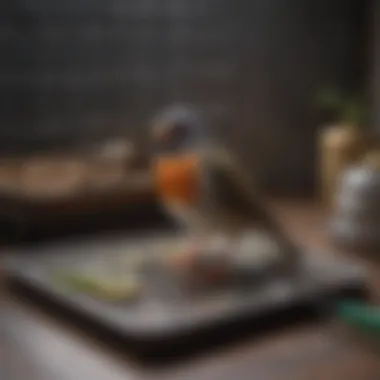
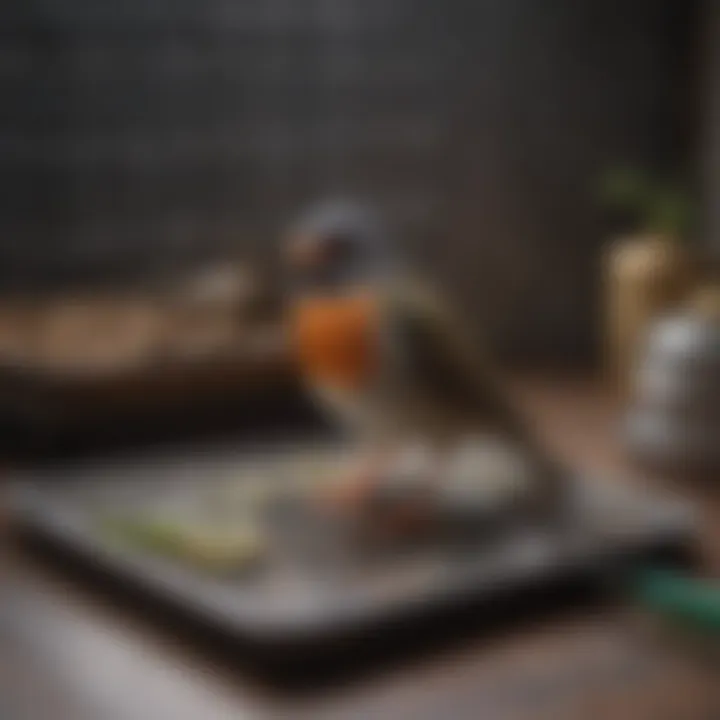
Initial Investment
When selecting a replacement tray, the upfront cost is often the first aspect that comes to mind. Different materials, such as plastic, metal, and wood, each have varying price points. Plastic trays tend to be more affordable, often appealing to those on a tight budget. However, this lower initial expense might come at the cost of durability over time.
For instance, metal trays are usually priced higher but offer greater longevity. This longevity can be a decisive factor, as spending more upfront may save you from frequent replacements. It's critical to assess your specific needs and determine how often you expect to replace the tray.
Moreover, the size and design of the cage also impact the expense. Custom trays, while more expensive, may fit better and provide improved functionality. Ultimately, the initial investment varies significantly depending on the choice of materials and the specific requirements of your bird cage.
Long-Term Savings
Evaluating long-term savings is a vital part of the cost versus benefit analysis. Although some may opt for cheaper trays, they could find themselves spending more on replacements over time. Durable materials, like metal, may have a higher initial cost but often pay off by not needing replacements as frequently.
When considering this aspect, it is also important to evaluate cleaning costs. Some trays are designed for easier cleaning, which can enhance their longevity. If a tray requires less maintenance and cleaning product usage, the time and money saved could add up significantly.
Additionally, investing in a quality tray can mitigate health issues related to poor hygiene. By preventing bacterial growth or reducing allergenic particles in the cage, you might avoid potential veterinary costs related to common avian illnesses. This could lead to substantial savings over time, making a higher initial investment in a better-quality tray worthwhile.
"Choosing the appropriate replacement tray transcends mere cost considerations; it's an investment in your bird’s health and wellbeing."
In summary, understanding the dynamics between the initial costs and potential long-term savings allows bird owners to make choices that not only protect their pets but also enhance their owning experience.
Where to Buy Replacement Trays
Finding the right place to purchase replacement trays for bird cages is essential for every bird owner. This section will detail various purchasing avenues and their unique benefits. The right choice can enhance not only the ease of finding quality materials but also ensure that you are supporting your birds’ wellbeing with the best products available.
Online Retailers
The Internet offers a wide array of options for buying replacement trays. Online retailers such as Amazon and Chewy provide a convenient platform to compare different products. Here, buyers can read detailed descriptions and customer reviews. This feedback becomes instrumental in assessing quality and functionality.
- Advantages of online shopping include:
- Extensive selections and brands.
- Competitive pricing often leads to discounts.
- Convenient home delivery, saving time and effort.
However, one should also consider the potential downsides. In many cases, shipping costs can add to the overall expense. Additionally, the trays may arrive damaged or not as expected. It’s beneficial to check return policies prior to purchase to ensure satisfaction.
Local Pet Stores
Shopping at local pet stores provides a tangible experience that online shopping cannot replicate. Stores like PetSmart or Petco often carry replacement trays that can be examined before purchase. It allows bird owners to assess the material and size directly, ensuring compatibility before bringing them home.
- Benefits of shopping locally include:
- Immediate access to products.
- Ability to seek advice from knowledgeable staff.
- Supporting local businesses which enhances community life.
That said, local options might not always have the same variety. It is possible that specific sizes or materials are only available online. Therefore, an initial visit to local shops can help determine what is available before expanding options online.
Custom Options
For those seeking specialized trays, custom options may be the ideal solution. Custom suppliers often cater to specific cage designs or unique needs of certain bird species. This can ensure a perfect fit, which enhances both safety and comfort.
- The advantages of custom trays include:
- Tailored dimensions specific to different types of cages.
- Unique material choices that further enhance durability.
- A chance to support artisan crafters or small businesses.
Although custom trays can come at a premium price, the benefits often outweigh the cost. Bird owners who invest in these tailored products may experience long-term savings, as the right tray can mitigate issues like spillage and mess, reducing the frequency of cleaning efforts.
In summary, the pursuit of replacement trays should involve careful consideration of where to obtain them. Online retailers, local pet stores, and custom options all present unique benefits and potential drawbacks. A good understanding of these elements can empower bird owners to make educated choices.
User Reviews and Recommendations
User reviews and recommendations play a significant role in selecting replacement trays for bird cages. They provide insights that may not be present in product descriptions or marketing materials. The experiences of other pet bird owners can highlight practical aspects of a product, such as durability, ease of cleaning, and how well it fits in different cage types. Considering the factors mentioned, this section focuses on the importance of evaluating feedback from users and understanding expert opinions that can help guide your purchase decisions.
Evaluating Product Feedback
When assessing product feedback, it is crucial to look beyond the star ratings. Look for detailed descriptions in reviews, as they can offer specific information about how a replacement tray performs over time. For example:
- Durability: Does the tray hold up under normal conditions? Are there instances of warping or cracking?
- Ease of Cleaning: Reviews may reveal if certain materials or designs make cleaning easier or more challenging.
- Fit and Compatibility: Understanding whether the tray fits well in various cage sizes is vital. Owners often mention if the tray slips or if there are gaps.
It is also advisable to consider the volume of reviews. A high number of reviews can indicate that a product is popular and widely used, while a lower number may raise questions about reliability. Reading both positive and negative feedback will help form a balanced view.
"User feedback not only reflects individual experiences but can also indicate recurring issues that might not be apparent at first glance."
Expert Recommendations
Expert recommendations also add weight to the decision-making process. These insights often come from avian specialists or experienced bird owners. Their recommendations are usually based on extensive research or practical experiences with multiple products. Here are some points to consider when evaluating expert recommendations:
- Trusted Sources: Seek insights from reputable avian health organizations or forums. Experts can give you advice on premium brands known for safety and durability.
- Specific Product Endorsements: Recommendations for specific models can guide you towards options that best fit your needs. This is particularly useful if you are not sure what materials or sizes are best for your bird species.
- Safety Considerations: Experts often emphasize safety features. Recommendations that focus on non-toxic materials and easy-to-clean surfaces are essential for maintaining bird health.
Future Trends in Bird Cage Accessories
The landscape of bird care is evolving, influenced by research and advances in materials and design. Future trends reveal not only what to expect from replacement trays but also how these developments can optimize the habitat for pet birds. These trends augment the overall well-being of avian companions while enhancing user experience for bird owners. Tracking these advancements is essential for making informed decisions.
Innovative Materials
As pet care continues to progress, the introduction of innovative materials is one of the most significant trends in bird cage accessories. Traditional options like plastic, metal, and wood are now being improved or replaced by advanced materials that offer superior characteristics.
For example, some new materials are more resistant to cleaning agents, which can simplify maintenance. These materials may also have antimicrobial properties, which are beneficial for reducing the risk of bacterial growth within the cage. Eco-friendly options, such as biodegradable composites, provide an alternative for those environmentally conscious bird owners.
The benefits of these materials often extend beyond just hygiene. Some are designed to be lighter and more durable, allowing users to replace trays more easily. Furthermore, innovations may even provide customizable features—such as colors or embedded scents—to create a more visually appealing or inviting environment for the birds.
Design Advancements
Design trends are equally important as material innovations in the future of bird cage accessories. The focus has shifted towards creating trays that not only serve a functional purpose but also contribute to the aesthetic of the bird’s living space.
- Modular Designs: These designs allow for easy assembly and disassembly, which means a thorough clean can be performed without hassle. This flexibility is commendable for bird owners who prioritize fast maintenance routines.
- Ergonomic Features: Some newer designs are being developed with ergonomic features in mind. This can aid in ensuring that birds can access food and water easily, promoting a healthier lifestyle. For example, trays designed with sloped sides may prevent food spillage, keeping the cage cleaner.
- Integrated Technology: Innovations may include trays that connect to smartphone apps, providing alerts when cleaning schedules should be followed, or suggesting material replacements based on usage statistics. This intersection of technology and care can enhance the owner’s experience.
These advancements reflect the growing understanding of bird behavior and needs, changing substitutive components from being mere accessories into must-have essentials for the modern pet bird owner. For anyone looking to invest in their bird's habitat, these trends highlight new opportunities for improving avian care.















